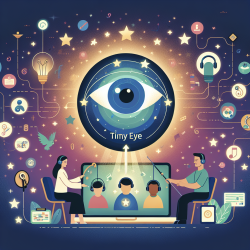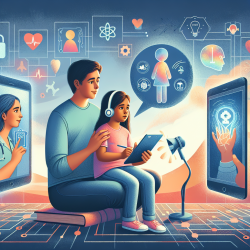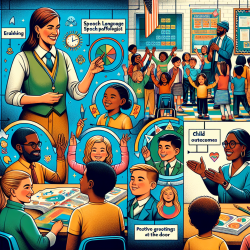In the ever-evolving landscape of special education, the integration of technology has revolutionized the way services are delivered to students. One of the most impactful innovations is the advent of online therapy, particularly in the realm of speech-language pathology. At TinyEYE, we are committed to providing high-quality virtual therapy services to schools, ensuring that every child has access to the support they need. This blog delves into the nuances of virtual therapy and its transformative impact on special education, specifically from the perspective of Speech Language Pathologists (SLPs).
The Evolution of Virtual Therapy in Special Education
The concept of virtual therapy is not new, but its application in special education has gained significant traction in recent years. The COVID-19 pandemic accelerated the adoption of online therapy, highlighting its potential to bridge gaps in service delivery. For SLPs, virtual therapy offers a unique set of advantages that traditional in-person sessions may not provide.
Accessibility and Convenience
One of the primary benefits of virtual therapy is its ability to make services accessible to students regardless of their geographical location. Schools in rural or underserved areas often face challenges in recruiting qualified SLPs. TinyEYE's online therapy platform eliminates this barrier, connecting students with certified professionals from anywhere in the world.
Customized and Flexible Scheduling
Virtual therapy allows for more flexible scheduling options, accommodating the busy lives of both students and therapists. SLPs can easily manage their caseloads and tailor sessions to meet the individual needs of each student. This flexibility is particularly beneficial for students with complex schedules or those who require frequent, shorter sessions.
Enhanced Engagement Through Technology
Today's students are digital natives, and incorporating technology into therapy sessions can enhance engagement and motivation. TinyEYE's platform includes interactive tools and resources that make learning fun and effective. For example, digital games and activities can be customized to target specific speech and language goals, making therapy sessions more dynamic and enjoyable for students.
Challenges and Solutions in Virtual Therapy
While the benefits of virtual therapy are substantial, it is important to acknowledge and address the challenges that may arise. One common concern is the potential for technical difficulties, such as poor internet connectivity or software issues. TinyEYE has invested in a robust, user-friendly platform designed to minimize these disruptions and provide technical support when needed.
Building Rapport and Trust
Another challenge is building rapport and trust with students in a virtual environment. SLPs must employ creative strategies to establish a connection with their students. This may include using visual aids, incorporating students' interests into sessions, and maintaining consistent communication with families and school staff. Over time, these efforts can foster a strong therapeutic relationship, even from a distance.
Ensuring Privacy and Confidentiality
Privacy and confidentiality are paramount in any therapeutic setting. TinyEYE adheres to stringent data protection protocols to ensure that all student information is secure. Our platform is compliant with relevant privacy regulations, providing peace of mind for schools, families, and therapists.
The Future of Virtual Therapy in Special Education
As technology continues to advance, the future of virtual therapy in special education looks promising. Innovations such as artificial intelligence and virtual reality hold the potential to further enhance therapy services. For SLPs, staying informed about these developments and integrating new tools into their practice will be crucial in providing the best possible care for their students.
Professional Development and Collaboration
Ongoing professional development is essential for SLPs working in virtual therapy. TinyEYE offers training and resources to help therapists stay current with best practices and emerging technologies. Additionally, collaboration with other professionals, such as teachers and occupational therapists, can enrich the therapeutic process and support comprehensive student development.
Empowering Students and Families
Ultimately, the goal of virtual therapy is to empower students and their families. By providing accessible, effective, and engaging therapy services, TinyEYE helps students achieve their full potential. Families play a crucial role in this process, and our platform includes features that facilitate family involvement and support.
Conclusion
Virtual therapy is transforming the landscape of special education, offering new opportunities for students and SLPs alike. At TinyEYE, we are dedicated to leveraging technology to provide exceptional therapy services that meet the diverse needs of students. By embracing virtual therapy, SLPs can enhance their practice, reach more students, and make a lasting impact on the lives of those they serve.
For more information about TinyEYE's online therapy services, please visit our website or contact us directly. Together, we can make a difference in the world of special education.










